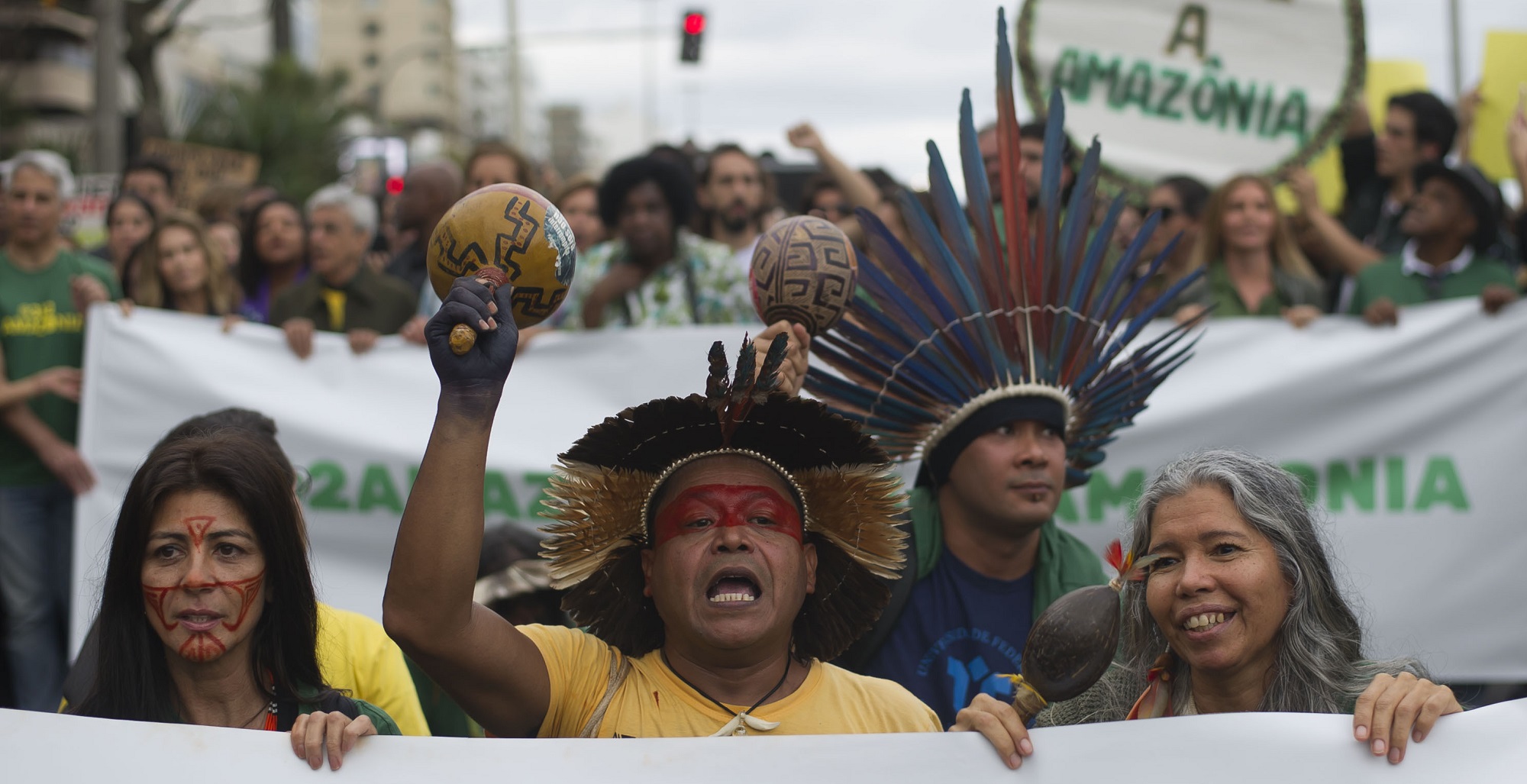By now you’ve heard that parts of the Amazon rain forest, which stretches across nine countries in South America, has been burning for several weeks. The areas being affected are in Brazil, where there has been an 80 percent increase in fires compared to last year, according to Brazil’s National Institute for Space Research.
As images of the fires spread on social media, world leaders, activists, and celebrities have demanded immediate action to preserve the rainforest. With more details emerging around the cause of the fires, it is becoming clear that this is another example of environmental injustice by government and big businesses that abuse power and neglect the needs of the people. Those who will suffer the most from these fires are already the most marginalized: the many Indigenous peoples, and Quilombos, descendants of enslaved Africans, who live in the Amazon. There are striking similarities between what is happening to these communities and what environmental issues Black Americans have faced in their own communities. For this reason, African-Americans should be alarmed about this global issue too.
Firstly, let’s discuss what’s happening in Brazil. Since taking office in January, Brazil’s President Jair Bolsonaro promised he would use the Amazon for agricultural businesses and mining. One of the areas Bolsonaro is aiming to turn into a mine is the National Reserve of Copper and Associates, also known as Renca.
“Let’s talk about Renca. Renca is ours,” Bolsonaro said in April, according to Reuters. “Let’s use the riches that God gave us for the wellbeing of our population.”
Renca is also part of where the Waiapi people, an indigenous community, call home. There are more than 350 indigenous peoples living in the Amazon and they have been pushing back against Bolsonaro’s plans calling it a threat to their survival and warning that it would create long-term consequences for the earth’s climate.
“If we humans misuse this planet, our creator will make a great flood that will melt the planet, there will be great fires and fires that will destroy the planet,” Ororiwa Waiapi, a 98-year-old, Waiapi chief told NBC News. Waiapi is tirelessly working to end proposed deforestation.
If the Amazon fires continue, the rainforest will increase its carbon dioxide emissions leading to further global warming, according to the World Wildlife Fund. The Amazon also holds a wealth of plant life that is the source for treatments such as anti-cancer medicines.
Most Brazilians agree with Waiapi. According to a Datafolha survey by Instituto Socioambiental, a non-government organization, 86 percent of Brazilians don’t think mining companies should be allowed on indigenous lands.
Although current laws in Brazil make it so that mining projects are only allowed if approved by indigenous people, Bolsonaro is doing everything in his power to change this. For one, the government is reportedly drafting a bill that would allow these projects, that could be sent to Brazil’s Congress as early as Septemeber. Secondly, Bolsonaro’s cabinet appointments are in support of expanding agricultural businesses in Brazil’s Amazon. He also unsuccessfully attempted to transfer decision-making on indigenous affairs to government agencies that critics say would not work in the better interest of indigenous people, the Washington Post reported. Another reason the fires are becoming more prominent is that Bolsonaro’s messaging is encouraging his supporters to go forth with setting the fires and clearing the lands for farming.
What’s happening in Brazil is connected to the same systems that have harmed Black Americans’ environmental health and ultimately threatened their survival. Rev. Dr. Benjamin Chavis, a former NAACP executive director, coined the term environmental racism in the 1980s, to describe the kinds of conditions Black Americans have lived in as citizens since being trafficked to America from Africa 400 years ago.
“It is the deliberate targeting of people-of-color communities for toxic waste facilities and the official sanctioning of a life-threatening of poisons and pollutants in people-of-color communities,” he said at the time. “It is also manifested in the history of excluding people of color from leadership in the environmental movement.”
Decades later, this still rings true. According to a 2018 report from the Environmental Protection Agency, Black Americans are three times more likely to die from air pollution than White Americans.
For example in Flint, Michigan, residents, predominately black and poor, lived without clean water for years after the Mayor switched the water supply from the Detroit water system to the Flint River in 2014, with the intention to cut costs. The levels of lead in children’s blood increased during this time. A report by the Michigan Civil Rights Commission in 2017 found that “The people of Flint have been subjected to unprecedented harm and hardship, much of it caused by structural and systemic discrimination and racism that have corroded your city, your institutions, and your water pipes, for generations.”
In the predominately Black town of Reserve, Louisiana, located between Baton Rouge and New Orleans, residents are 50 more times likely to be diagnosed with cancer than anywhere else in the country, according to the Environmental Protection Agency. Because residents face such a high risk, the town is known as “Cancer Alley.” There are 100 petrochemical plants and refineries located in the town of 10,000.
As Black Americans watch another case of environmental injustice unfold abroad, the distance from the crisis may make them feel removed from it. However, they can stand in solidarity by remembering environmental injustices may not be much farther away from their own doorsteps. Clean water, air, and environments in America are at risk for contamination and resources for them are at risk of being destroyed every day. Organizations such as South Bronx Unite, in the Bronx, the Deep South Center for Environmental Justice at Dillard University, and WE ACT for Environmental Justice in Harlem, are some of the folks committed to doing the work to dismantle these issues.




